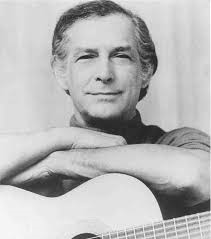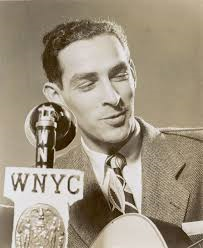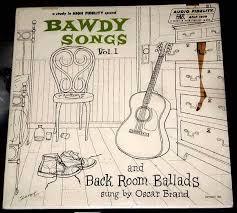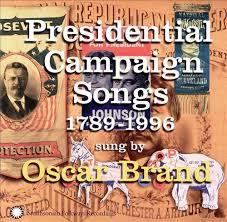If most deaths are like losing a page or a chapter, Oscar Brand's death Friday was like losing a book.
The phrase "living encyclopedia" gets tossed around a little too loosely, but when it came to folk music in the broadest, richest, most satisfying scope, there's no other way to describe Oscar Brand.
He was 96 when he died of pneumonia at his Great Neck, N.Y., home, according to his manager Doug Yeager. Less than a week before he had hosted his final Folksong Festival, the weekly radio show he launched in 1945 over New York's WNYC.
He hosted the show for more than 70 years, the longest single-host radio program in history. That put him in the Guinness Book of World Records, and he could have had a double entry if there were a category for "least money earned from a radio show," because from start to finish he never took a red cent.
And say, speaking of "red cent," perhaps Brand's most shining achievement was using the radio in the early 1950s to showcase music of singers who were blacklisted almost everywhere else because of the cynical fantasy that communists were somehow infiltrating and subverting American entertainment.
When promoters and record companies were afraid to be seen or heard with artists like Pete Seeger, the door to Folksong Festival remained open.
"I probably went too far in the direction of political folk music," Brand said 35 years later. "But my show, for some of them, was the only place they could still be heard."
Brand got branded a communist sympathizer himself by the magazine Red Channels. For better or worse, he was never summoned to face a direct accusation from U.S. Sen. Joe McCarthy's headline-hunting committee, but he clearly felt the breeze from McCarthy's broomstick.
He suggested that perhaps he wasn't called to testify because "I hated Joe Stalin and I wasn't afraid to say so. So I never joined the [communist] party."
No headline there.
Whatever the reason, Brand had good instincts on Stalin and at the same time a good sense that the real Un-American activity in the early 1950s was blacklisting people who favored radical concepts like civil rights and peace.
For all his longevity, Oscar Brand never scored the kind of hit records or high profile as other folksingers from Woody Guthrie or Leadbelly to Judy Collins and Emmylou Harris.
While he recorded more than 100 albums, he often preferred to dust off quirky and sometimes bizarre old songs. Anyone who thumbed through folk music albums in the 1960s remembers Brand from a series of albums called Bawdy Songs and Back Room Ballads.
These ranged from "Barnacle Bill the Sailor" to barroom sing-alongs about lusty maidens, and by today's standards many of them weren't much bawdier than your average Katy Perry tune.
But Brand's repertoire collectively made a much broader and more impressive statement: that folk music is whatever folks are singing.
Back in the days when people largely entertained themselves, folk music was what got passed down through religious ceremonies, neighborhood parties, back-porch hoedowns, Saturday night dances, low-budget juke joints and the piano in the parlor.
Woody Guthrie put his own words to melodies that had been appropriated by A.P. Carter for the Carter Family. Whatever the intellectual property issues, it was folk music.
When Oscar Brand launched his radio show, he was playing old Tampa Red blues songs. By the 1990s he was interspersing hip-hop, because he knew that what kids were playing for block parties in the Bronx was the music of the folk, that is, folk music.
Listen to Oscar Brand's radio shows over 70 years and you were tracking folk music. It wasn't a comprehensive study, but it was the kind of solid survey course that it's very hard to find in a field where a lot of musicians and experts will tell you exactly what they think belongs and what doesn't.
Brand gave it all a chance. When a young Bob Dylan arrived in New York from Minnesota, his first radio interview was with Oscar Brand.
Dylan spun an amusing tale about traveling with a carnival, which he didn't, and Brand just let him talk, which is a wonderful legacy for any host to leave.
One of Brand's most interesting recordings was a collection of presidential campaign songs from 1789 to 1996. He included one song from every winning candidate, which means the likes of "Huzzah for Madison, Huzzah" and "Get On A Raft With Taft."
"Campaign songs tend to reflect the passion of the moment," he said in 2000, which makes it even more interesting that music has played a very subdued role in the 2016 campaign.
As for his own political observations, given that he was a friend of Eleanor Roosevelt and a traveling companion of Woody Guthrie, Brand said in 2000 that he was cautiously hopeful about things gradually changing for the better.
"Odetta once kissed me on a stage and I got death threats from the Klan," he said. "When I traveled with Leadbelly, he couldn't get a sandwich in the places we stopped.
"In ways like that, we're better off. Young people don't know it because they don't realize how things used to be. But even though we're on the right road, the only way we'll stay on it is for people to object to anything that isn't democratic - and to vote for leaders who will do the same."
Oscar Brand never hesitated to remind people he was an artist. But he also made himself into an historian and, really, a journalist.
He was a folksinger who never lost faith in the power of the folk to create music.




